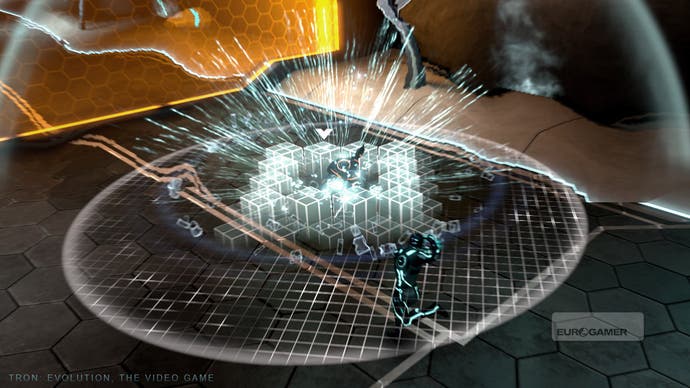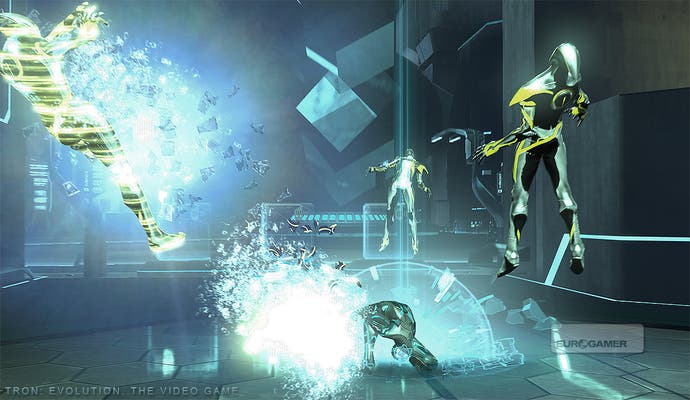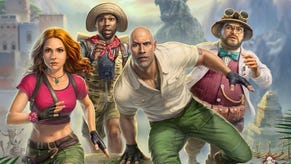TRON: Evolution
Unnatural selection.
What do the programs on your computer get up to in their idle moments? Parkour, apparently, at least according to this prequel to the sequel to the 1982 movie about what happens when Jeff Bridges has a fight with Atari.
While the image of Microsoft Word scurrying about atop digital skyscrapers is rather ludicrous, it's part and parcel of a slightly muddled reimagining of the stark pixel realm from the original movie; where once there were minimalistic worlds drawn only from glowing neon lines, there's now a sprawling city riddled with curious anomalies.
Programs mill about aimlessly in its streets, illuminated by street lamps (computer programs have poor night vision, it seems). There's a computer nightclub, with a bartender serving digital booze, which at least explains why Firefox keeps crashing. There are even vents in the pavement, spewing steam. Steam? In a computer? But, hey, it's difficult to take the physics too seriously when there's a rainstorm later on. By the end of the game I was left feeling a lot like Futurama's bewildered Hermes, faced with Bender's undersea cigar. "This just raises further questions!"
Such inexplicable additions are relevant only because they tug the distinctive imagery of the 1982 film into a more generic sci-fi setting, the concept that this is all taking place on a hard drive becoming increasingly abstract as the story unfurls.

It's a story that casts you as the aptly named Anon, a security program dropped into TRON's world by creator Flynn to investigate weird occurrences. Rogue self-aware programs called ISOs have started appearing, apparently exhibiting free will. This leads to a schism between the traditional programs – Basics – and their new individualistic neighbours. You can tell the ISOs are digital outcasts because they have emo haircuts and wear long leather coats with bare tattooed chests. There's also a virus infection on the loose, spread by the mysterious Abraxas.
It all leads to a fairly standard power struggle in which every sacrifice and betrayal announces itself in advance while you try to remember who is who and why you should care. Thankfully, everyone is colour-coded, which makes keeping score a lot easier.
Sandwiched in between these lumpy expositional blurts are seven fairly brief levels, comprising lots of Prince of Persia-style platforming, plenty of light disc combat and sporadic light cycle dashes or tank battles. It's a familiar stew, made using predictable ingredients, but there's something to be said for the unfussy nourishment it provides.
Exploration is standard fare, using strings of acrobatic moves to navigate linear paths to the next cut-scene. You can wall-run across gaps, cling and shimmy up sheer surfaces and use a magnetic upgrade to your disc to catapult yourself off digital sky hooks. Every now and then you'll enter a room where switches must be hit to open the path onwards.

Surprise, clearly, is not on the agenda. Still, it's fluid and satisfying, even if it's hard to shake the sense that the game is never really stretching itself or taking full advantage of its computerised setting.
Combat is similarly solid yet uninspired. You enter an area, innocent civilian programs run screaming as waves of enemies pile in to fight you. Once defeated, you can continue on to the next chunk of platforming.
You can throw your light disc at enemies, locking on to the nearest target automatically, or melee them up close. Attacks can be blocked, or rebounded with a well-timed button press.
As the game progresses, your disc gains additional powers. Heavy Disc is handy for pulverising armoured foes. The cryptically titled Explosive Disc explodes on impact. Stasis puts enemies in a state of slow motion, while Corrosive powers deal damage over time and siphon a little health from your enemies to yourself. All are augmented with radial and slam options, pulled off by using the left or right triggers to modify the attack.
These moves use up your energy reserves, which are topped up by vaulting over illuminated nodes in the game world. Health is refilled in a similar way, by wall-running along (or up) glowing strips on the walls. It's a novel idea, one of the few that TRON can call its own, and it introduces the one sliver of strategy into an otherwise by-the-numbers action experience, as awareness of your environment plays a vital role.









